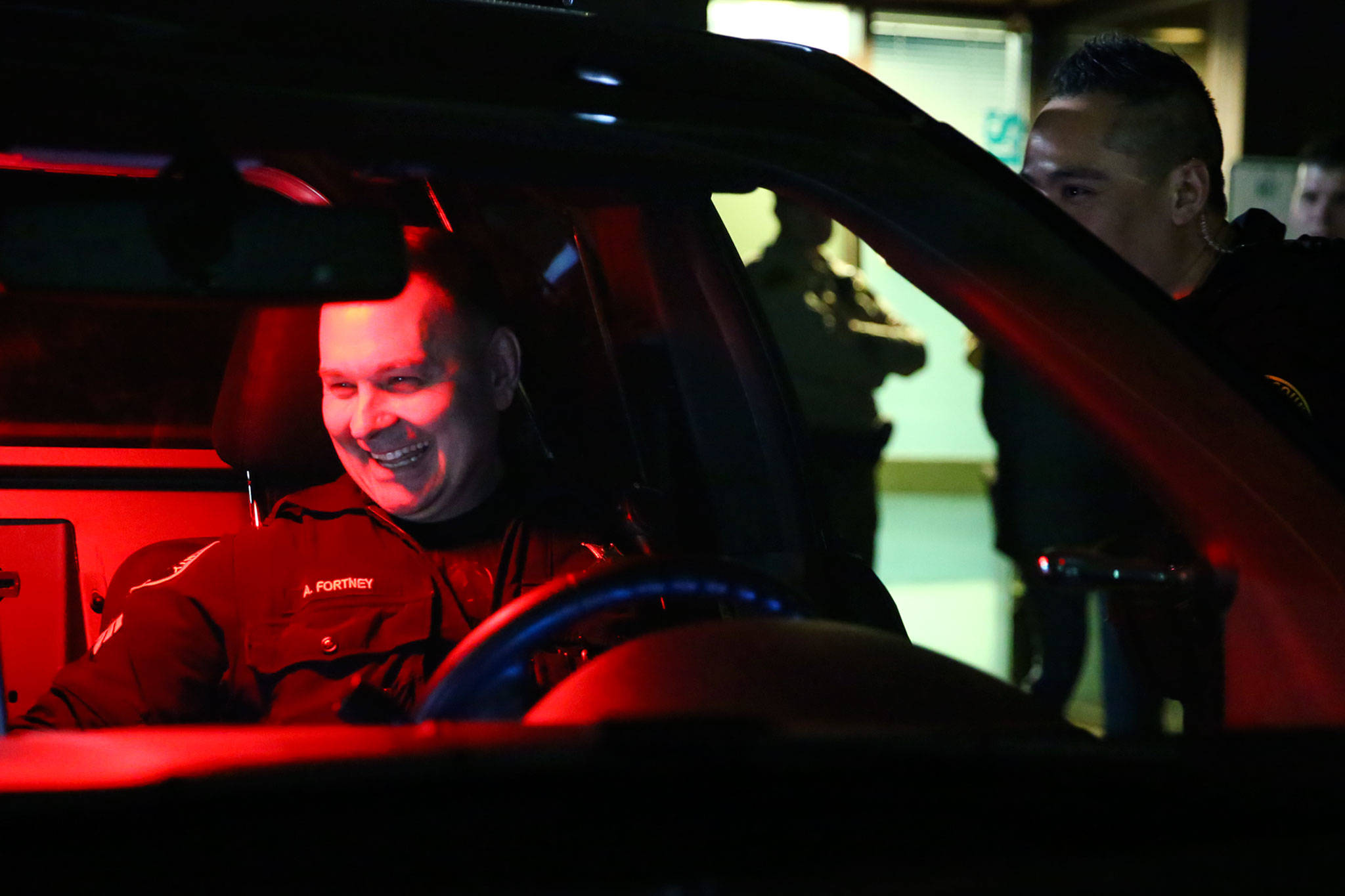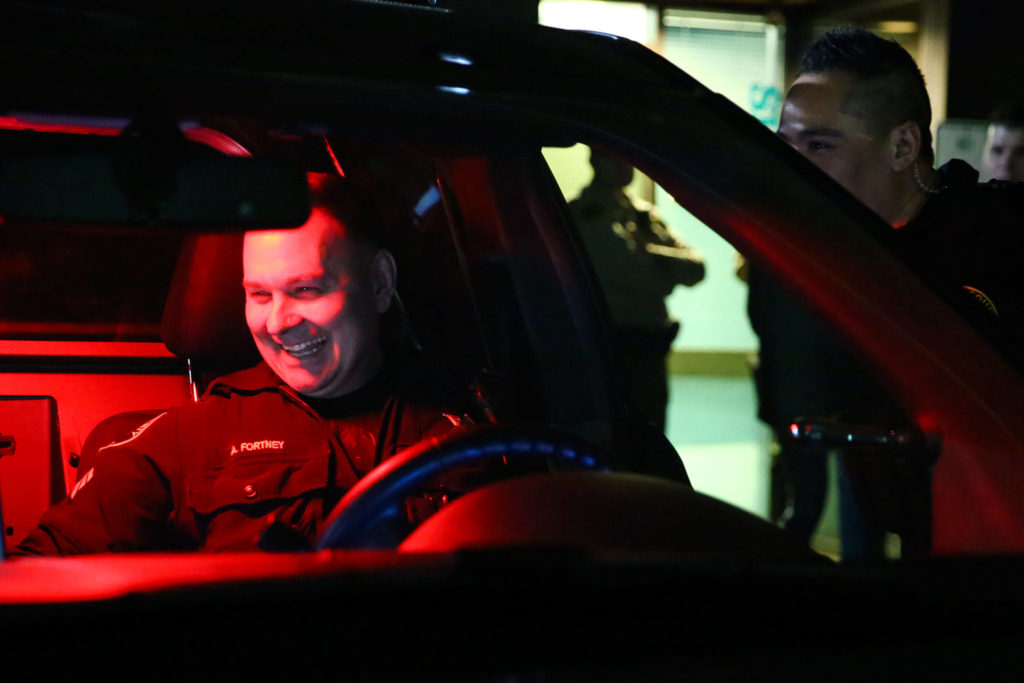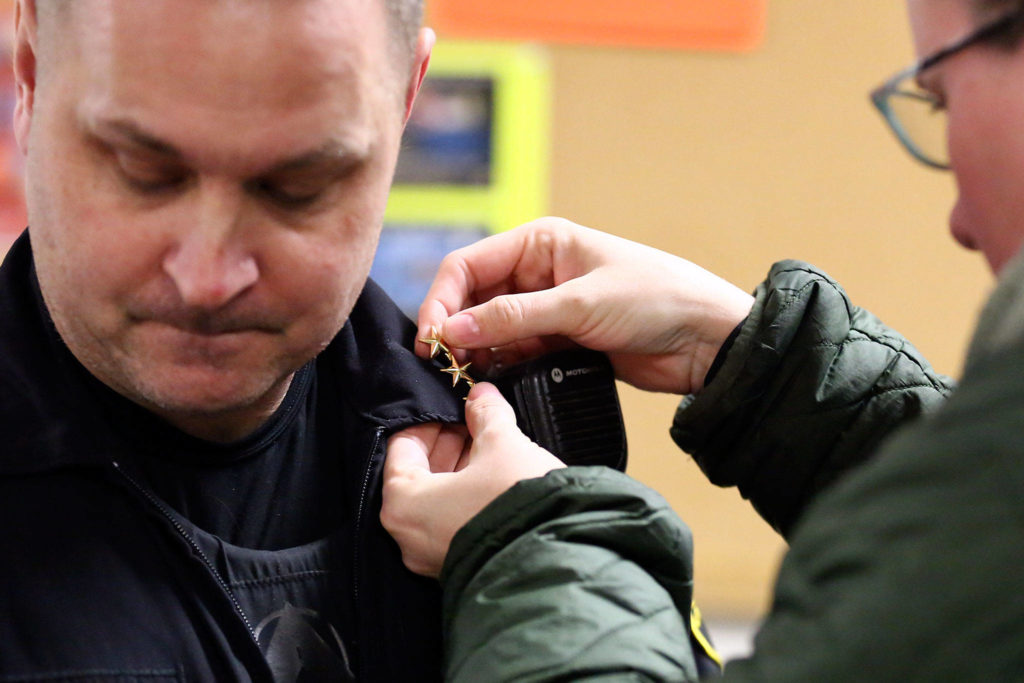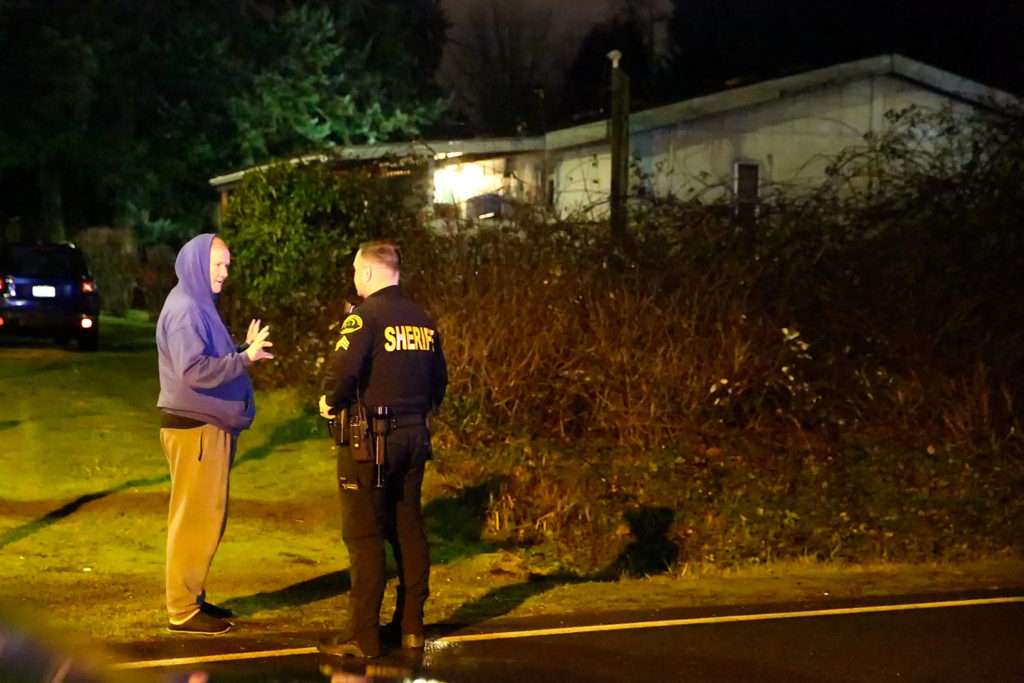MILL CREEK — As fireworks exploded signalling the arrival of a new year, Adam Fortney reached for the radio inside his patrol car, squeezed the button and announced his arrival as Snohomish County’s new sheriff.
At that moment, he became 10A1, the call sign reserved for the top job at the county’s largest law enforcement agency.
Fortney, a former sheriff’s deputy union leader and night shift patrol sergeant, unseated his then-boss, Ty Trenary, in the November election with an aggressive campaign. It was his first run for political office, and at times, it got tense.
Fortney pledged to return stricter law and order to the streets where Trenary, who had served in the post for six years, touted a more compassionate form of law enforcement. Before the campaign ended, deputies were fired, citizen ride-alongs were suspended and claims of corruption were made.
Fortney won resoundingly.
Now he’s risen from supervising a handful of deputies to overseeing hundreds of employees, who patrol a vast expanse of unincorporated county land, run the county jail and carry out a range of other law enforcement duties. His annual salary is nearly $166,000.
Fortney began his new job like it was just another day in his 23-year career with the department: on graveyard patrol in South Precinct.
His newly installed command staff hit the streets too. It wasn’t a request. It was an order. The new boss wanted to send a message to deputies that he wouldn’t forget the hard work they do each day, or where he came from.
Days earlier, Fortney sat down with The Daily Herald for a wide-ranging interview on what he planned to do or not do. In a policy change, he will allow deputies to grow beards. He will not be shuttering the Office of Neighborhoods, the unit that works with embedded social workers to offer services to people who are unsheltered or addicted to drugs.
At the time of the interview, Fortney was in the midst of the transition and still pulling graveyard shifts. Here are excerpts, edited for length, providing a flavor of the new sheriff’s mindset.
Question: Is life a little less stressful now?
Answer: It is completely different than the political stuff, which I’m glad is over. It was a good experience, but man, unless you are ready for it, I wouldn’t recommend it to anybody.
Q: Why did you want to stay on the night shift so bad when you were sheriff-elect?
A: It’s tough to give it up. I really do love it. So I am going from something that I love to something that I think that I will love. But it is a different kind of job. It is overwhelming and it is a change. I don’t mean that in a bad way. It is just adjusting to the new job. I’m seeing that there is very little patrol work from here on out (as sheriff). That’s just the way it has to be. But there will be patrol work.
Q: How often?
A: One of the things that I want to change is keeping command staff in touch with where we come from, our roots, which is patrol. I’ve already told them, ‘You guys can set your schedules as you want. I just want to see you out there every now and then.’ I am trying to make a statement, saying we’re going down a different path.
Q: Your command staff includes some who openly supported the former sheriff and may disagree with your program.
A: I think all my choices surprised a lot of people. I don’t want ‘yes men’ in there. I want people challenging me. I think that’s what I got with everybody here.
Q: There will be changes?
A: If something is working I am going to keep it. I am going to ride that as long as I can. Obviously I ran on change and we want to make change. And some of the command staff will reflect that. We are not doing wholesale changes right away. Cops don’t like change, anyway. So we are going very slow.
Q: The Office of Neighborhoods, is anything happening with that?
A: Staying put. I’m excited about the stuff that they do. That leads to community court. I sat in this same room (at The Daily Herald) and talked about accountability and being tough on crime. I think that (community court) is the pathway where we get both. We can arrest these folks and deputies right there at the scene can cite them into community court. Within that court they can get them on a different path if they choose to. If not, you still have consequences if you mess up the path that the judge has laid out.
I am not changing the MAT (Medication-Assisted Treatment) program. I listened to a whole panel of doctors at corrections specific to the MAT program. It’s weird. We’re giving narcotics to people but it’s a very low amount. We just want to keep them from getting sick or less sick and keep them stabilized after. We are seeing some really cool stuff. They are on the cutting edge, I am talking in the nation, of doing this stuff.
They’re fixing people at least while they have them there. It is fantastic. You’ve heard me a little bit and you know I talked about booking people and stuff like that, but if we can change people’s lives, I’m all for it.
Q: A lot of people in the social services arena have concerns about you becoming sheriff. Have you spoken with them?
A: Oh yeah. Have I talked to everybody who has those concerns? Probably not. But all the ones that I have, I think I stayed and answered all of their questions, and I think that once they hear from me in person, and I can elaborate on some of this stuff, they are relieved and a little bit excited to work with me in the future. I am not saying they wouldn’t like Ty a little bit better. Probably so. But again, what I got tagged with in this campaign is that all of that stuff is going away, and we’re going to book everybody, and everybody (in the sheriff’s office) is going to patrol. It’s just not the case.
If we’re changing people’s lives, how could I change those programs? Even if I think there’s a huge staffing crisis in patrol, which I think there is. That stuff is working. Ty gets all the credit for that. I met with Office of Neighborhoods. They were like, ‘Adam, this stuff is working, you’ve got to keep us.’ Nobody has the solution to this opiate thing. We might tweak stuff here and there and hey, maybe in a year, a year-and-a-half, Office of Neighborhoods isn’t working, we go in a new direction. Right now, we’re going full steam ahead.
Q: Do you see yourself working any differently with ICE and federal authorities?
A: I know it’s a hot issue in the public. It’s not a big deal for me. You know that I’m a fairly conservative guy. I don’t mind working with any of the feds when it’s keeping Snohomish County safe. We will never go out and do federal immigration law. If anyone in the community calls us for help, we will respond and help them. If we get a violent individual who is also in the country illegally, and I am able to legally work with ICE, I would have no problem doing that.
Q: If an Immigration and Customs Enforcement agent calls you and says they can’t get a detainer and asks you to hold that person, what will you do?
A: My layman’s understanding is we can’t do that any more. If it is legal and ethical and we can hold a guy for a day or two, I wouldn’t have a problem with that if it gets a violent person out of our community. I have to follow the rules. No matter what my personal views are, either way, I am going to follow the rules.
Q: What about use of body cams. Any thought about that?
A: I don’t see them coming here simply because of cost. It’s not the purchase cost. It’s the storage of the data. Our public disclosure unit can barely keep up with just the police reports people want, or emails, or anything from the Snohomish County Sheriff’s Office that people have a right to see. I can’t imagine all the body cam footage that would come in. I am not opposed to them at all. I don’t see them coming to Snohomish County any time soon. If there’s some big push from the (county) executive level or something like that, maybe that changes.
Q: Would you push for them?
A: No. I’ve got too many other things I want to do.
Q: Do you have a number in mind for any staffing increases?
A: I don’t have a number yet. We’re trying to get six months in and get our legs under us, get a grasp on staffing, figure out where we’re at and where we need to be. We are not making a bunch of promotions, because when you do that, the trickledown effect is that eventually someone from the road (patrol) comes up and gets promoted.
Q: What’s the deal with uniforms?
A: We wear tan and green typically, but we also have black jumpsuits authorized. They are way more comfortable but they are fairly expensive, about $500. The department won’t buy them. That’s been a topic among deputies for years and years. We’ve tried to get ‘em and the answer has always been no. We’re going to try to make it happen right away. That’s pretty minor, but it is a big deal for people.
Q: Are there any major policy changes right away?
A: I can’t think of anything. Oh, I got one. The guys have been asking for years if they can have beards. I told them if you write me a policy, I will sign it. It does not bother me as long as they are neat and trim. There is more excitement about this uniform thing and the beard thing than anything else. It’s the little stuff that people care about.
Q: Are you personally growing a beard?
A: No, I probably won’t, because it would probably take me two months to do it.
Q: Not even a mustache?
A: No, definitely not. But if it makes people a little more comfortable coming to work. I care about how people are treated. I really don’t care what they look like.
Q: Will you be able to wear Seahawks blue on Fridays?
A: We will always be in uniform. But, like, if the Seahawks make the playoffs and they want to wear a Seahawks ball cap to work, why the heck not? I think it’s kind of cool. That’s just me.
Q: Plenty of people wonder how a graveyard patrol sergeant will make the transition to sheriff. What is your approach to leadership?
A: It is really simple to me. Just treat people right. Respect people. Value people. Give everyone a fair shake when it comes to discipline and promotion and stuff like that. All the other stuff can be learned and worked through together. Whether that is going to be too simple and work or not, we’ll find out in time. It’s been a rough few years. It is just good to come to work and see people smiling again and have some excitement. I don’t take any credit for that. Maybe that is just change in general.
Q: Will the public have access to you?
A: I want to be out front more. I want to talk with you. I want to talk to the community. I think I’m obligated to after this election and they decided to give me a shot at this for four years. I acknowledge that nobody expected me to win this thing. I know there’s going to be a lot of eyes, including you guys, watching me. I want to be very transparent about the entire process, what we’re doing and why we’re doing it.
Reporter Caleb Hutton contributed to this story.
Jerry Cornfield: 360-352-8623; jcornfield@herald net.com. Twitter: @dospueblos
Zachariah Bryan: 425-339-3431; zbryan@heraldnet.com. Twitter: @zachariahtb.
Talk to us
> Give us your news tips.
> Send us a letter to the editor.
> More Herald contact information.





























